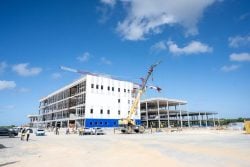Since political Independence, this nation built a society on the pillars of peace.
As coups toppled governments in neighbouring Venezuela, Suriname and Brazil, when religious fanaticism threatened the Trinidad and Tobago government, as Grenada suffered from a US Army invasion, our nation remained peaceful and calm.
The one blip on our history of pristine peace is, of course, the early ‘60’s ethnic strife in colonial times.
 But once we took responsibility for our own destiny, we became a peace loving people.
But once we took responsibility for our own destiny, we became a peace loving people.
Yet, ironically, we remain mired in under-development, gross poverty, declining literacy and a deepening pit of skills deficiency.
Despite being blessed with such a peaceful society, and with the enormous wealth of natural resources bestowed upon us, and lack of natural disasters, we still harbour a society that bustles around the Stabroek and Bourda markets cussing and sweating in social degradation.
Peaceful we are, but the shortage of skills and expertise to develop this land and its people is fast emerging as the crucial national emergency facing us.
All over the world, wherever we migrate to, Guyanese remain baffled that their homeland remains so under-developed. We have done so well elsewhere.
In Canada, the Bedessee family operates a multimillion US dollar food business that manufactures and trades Guyanese food across North America.
Rayman Bedessee, who manages the Toronto operation, said it’s painful that this country has such abundant wealth but no prosperity. It’s a telling observation. His father, Lionel Bedessee, had migrated from Corentyne in 1972. In 1977 he started a small food business selling Guyanese spices to his neighbours in Toronto.
Today, the company is a sprawling international success story. Why did Lionel have to migrate to achieve such outstanding prosperity? He built a food empire on the Guyanese taste, and, ironically, does not do much business within Guyana, the homeland.
Rayman feels this country has abundant wealth, but lacks the ability to convert it to prosperity for the people.
When former President Desmond Hoyte liberalized the economy, he sought to convert our natural wealth to prosperity. A big part of that plan was granting David de Caires the licence to open the Stabroek News.
The idea was simple: open up the society to the free flow of ideas, and people could then employ their initiative, their human capital and intellectual assets, in converting the natural wealth into a prosperous people.
We may have the world of riches, in gold, diamonds, possibly oil, agri and so on, but unless we hone our human capital, we cannot convert our wealth into prosperity.
Rayman Bedessee mentioned Hong Kong and Singapore as nations without natural wealth, but incredible prosperity. Those nations learned how to develop the innate intellectual capital of citizens.
We fail in that crucial task of developing a nation: we neglect our vital wealth builder, our human capital.
And so, faced with institutional and governing road blocks to our creativity and ingenuity, we migrate in droves. The ceiling in this country remains rather low for skilled professionals, and so anyone developing their professional skills soon hits that ceiling and feels the only way out is to migrate.
And so we lose our people – our most vital asset.
In the 2012 national budget, we see zero strategic direction from the Government in tackling this crucial emergency stifling us, pushing us down.
In fact, none of the political parties in Parliament proposes a sound strategy to re-build the national skills pool. The word “skills” was never once mentioned in the 2012 budget debates and presentations in Parliament. Instead, we saw a lot of criticism of “fat cats”. We saw severe criticisms of the level of State salaries, with claims that many of these were exorbitant and too high. Our national wage levels remain the lowest in the Caribbean region, except Haiti.
We cannot develop this society without professional skills. And we cannot attract back the professional skills that migrated unless we employ a strategy to pay and compensate professionals at salary levels comparable to the region.
Such myopic leadership damages this society’s ability to convert its wealth to prosperity, and forces us into the awful spiral of social degradation.
In two areas we must, as a matter of utmost urgency, turn things around: in opening up the free flow of ideas and constructive conversation across the society; and in employing a strategic plan to employ a pool of professionals with international capability.
Too many national conversations, including most popular media commentators, lack constructive criticisms and very few offer workable solutions.
The private sector knows the value of paying its top management world class salaries, and reaps the benefits. The rest of the society seems to think everyone should remain mired in poverty wages.
We need to create a provision for at least 2,000 skilled professionals, paid international-level salaries, to be deployed in development projects across this country. We need to plan to make that happen.
If we could successfully get these two things accomplished, we would be well on our way to converting our innate natural wealth into a prosperous lifestyle for our people
.
This society needs excellence of conversations in its public spaces, and sound thinking from its top leaders.
We should rejoice in the fact of our peaceful, blessed land. But we should not become complacent to the point where we become like the proverbial frog in the pot of water, slowly being boiled without realizing its ongoing demise.
The 2012 national budget reflects a complete absence of focus on our desperate lack of skilled professionals in this country. We are a 21st century society in the digital global village of the knowledge economy, and we crafted a budget less than US$1 billion, that completely ignores our most crucial national emergency.
And in peace and passivity, we accept the situation as inevitable.
The young who are becoming professionals look to migrate. Most of the rest of the society slowly sinks into the social degradation that has already lost a generation or two.
Peaceful we are, but passive and pliant to our plight.





